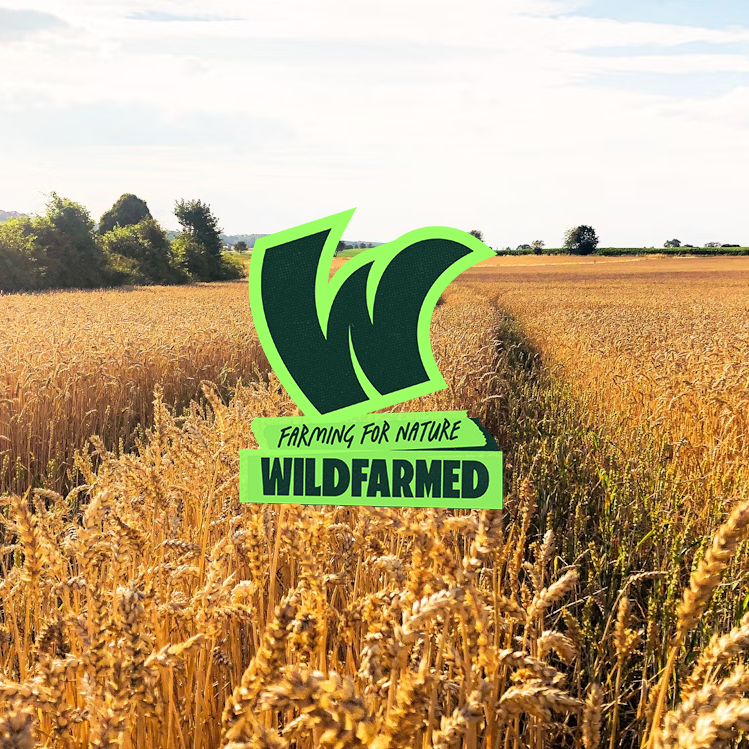WILDFARMED – The future of farming

WHAT IS WILDFARMED?
Wildfarmed is the leading regenerative farming and food business.
Wildfarmed is on a mission to accelerate the global shift to regenerative agriculture and make regeneratively farmed food accessible to all.
Founded in 2018 by Andy Cato, George Lamb, and Edd Lees, Wildfarmed unites farmers, businesses, and consumers to fix our broken food system. We grow wheat, oats, and barley in healthy, living soil—farming in ways that boost biodiversity, improve soil health, cut pollution, and store carbon.
Wildfarmed are passionate about increasing people’s awareness of how the food we eat is grown and improving our collective understanding of the impact it has on the environment. We believe that the food choices each of us make every day play a key role in helping move us towards a more resilient future.

Why did Wildfarmed choose to partner with Delicious Ideas?
Part of our mission is to make regeneratively-farmed foods accessible to everyone. Partnering with Delicious Ideas – who supply thousands of businesses across foodservice channel in the UK – means that regeneratively-farmed foods can reach a wide variety of customers up and down the country.
We want to give people the option of choosing food that can help them be part of the climate solution rather than the climate problem and be part of transforming the food system for the better – whether its enjoying a loaf of bread at home or grabbing a snack on the go – the more food grown in nature-rich landscapes can be accessible, the more of a positive impact we will be able to have on restoring ecosystems.
Why should a catering manager, chef, or ops manager care about regenerative ingredients? What difference does it make in their day-to-day decisions?
Sustainable sourcing isn’t just an opportunity to help the planet – it’s a chance for operators to connect with eco-conscious consumers.
Research shows that consumers are increasingly favouring businesses that align with their values. A 2024 PWC survey found consumers will spend 9.7% extra on sustainable goods, even in tough times. Wildfarmed’s own 2024 Brand Impact Survey also revealed that 87% of people expect businesses to improve sustainability which would indicate consumers are demanding more.
By using regenerative products like Wildfarmed, operators can stand out, connect with under-35 consumers, and build loyalty with the environmentally conscious.
The more food and drink made with regeneratively farmed ingredients available in bakeries, supermarkets, pubs, and restaurants, the greater our positive impact on the environment. It’s about giving people the power to choose—supporting farmers and nature while enjoying the food they love.
How did the Wildfarmed idea start?
Nearly twenty years ago, our co-founder Andy Cato paused his music career after learning about the environmental costs of industrial farming. Determined to grow food in harmony with nature, he bought a farm in France and began experimenting with regenerative methods. After years of trial and error, his bread gained local acclaim, leading him to team up with Edd Lees and George Lamb to create Wildfarmed.
Today, Wildfarmed connects a nationwide network of regenerative farmers with over 1,000 food businesses, from artisan bakers and Michelin-star chefs to major retailers – all using our sustainably grown wheat, oats, and barley.
How are most wheat and oats farmed today? & What is regenerative agriculture
Conventional farming relies on monocultures, chemicals, and heavy machinery to grow crops, but over time this has stripped soils of nutrients and life, reducing biodiversity, productivity, and resilience.
Our regenerative approach flips that on its head, using nature-led methods to restore what’s been lost. Most British fields have lost their life and soul, but regeneration brings back the party: a thriving mix of plants, animals, and microbes, creating a system where nature and food production can flourish together for generations.

And how does Wildfarmed approach farming?
At the moment there is not a precisely defined term, like “natural” or “healthy”, regenerative is a word anyone can use. At Wildfarmed we wanted to create a framework that meant our customers could be assured our grain is grown in a way that puts nature first and that improves biodiversity, soil health, water quality and reduces carbon emissions.
Our network of growers all use farming practices that align with our key principles of regenerative farming which focus on reviving ecosystems , these are:
- Limiting soil disturbance (both mechanical tilling and chemical inputs)
- Maintaining year-round soil cover (through cover and companion crops)
- Promoting plant diversity (Plant species richness and grazing animals where possible)
- Keeping living roots in the soil (Optimising photosynthesis)
- Nutrition Based on Need (Using plant analysis to determine nutritional inputs)

What kind of future do you see if more of the food industry shifts to regenerative farming?
Our Wildfarmed community is growing, allowing us to transform more landscapes and put more regeneratively farmed food on plates. To meet the UK’s nature and carbon goals while securing a resilient food supply, we must rapidly and sustainably scale this way of farming. Healthy soil and thriving ecosystems are not optional anymore, but essential for producing food in a changing climate.
Regeneration should be an easy choice for both shoppers and farmers. Awareness is growing, but even those unfamiliar with regenerative agriculture care about clean rivers, safe water, and tackling climate change.




